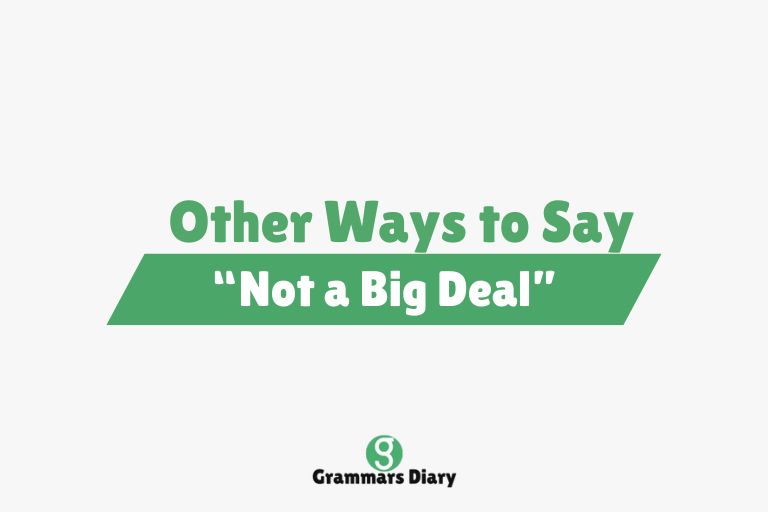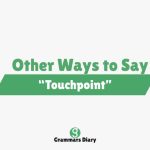The expression “not a big deal” is widely used in everyday conversations to downplay a situation, dismiss praise, or ease someone’s worries by suggesting that something isn’t important or worth stressing over. For instance, when someone says, “It’s not a big deal, don’t worry about it,” they’re likely trying to soothe concerns or minimize the gravity of what just happened. This phrase has become such a staple in informal communication that we often forget there are numerous alternative ways to convey the same relaxed or nonchalant sentiment — some with more formality, others with playful undertones, and several with subtle shifts in tone and meaning.
This article aims to introduce a range of expressions you can use instead of “not a big deal,” helping to expand your emotional vocabulary and offer more nuance to your daily interactions, whether you’re brushing off a mistake, comforting a friend, or trying to express modesty when someone compliments you.
Other Ways to Say “Not a Big Deal”
1. No biggie
Example: “You forgot to call back? No biggie, I figured you were busy.”
Meaning: A casual way to express that something is not a problem or issue worth stressing over.
Usage: Perfect for laid-back, informal settings where you want to reassure someone that a situation caused no trouble or harm.
2. No sweat
Example: “Thanks for doing this on short notice.” “No sweat — happy to help.”
Meaning: Suggests that the task or issue wasn’t difficult or burdensome at all.
Usage: Often used in response to being thanked, implying that the favor was easy and untroubling.
3. No worries
Example: “Sorry I’m a bit late.” “No worries, we haven’t started yet.”
Meaning: Used to ease tension, implying there’s no reason to be upset or concerned.
Usage: A go-to phrase in casual interactions when you want to instantly let someone off the hook.
4. Don’t mention it
Example: “Thank you for helping me carry those boxes.” “Don’t mention it.”
Meaning: A polite way of downplaying appreciation or saying that a kind act didn’t require acknowledgment.
Usage: Ideal for moments of modesty, especially after doing a good deed.
5. It’s nothing
Example: “Wow, you really went out of your way for me.” “It’s nothing.”
Meaning: Indicates that what was done was insignificant or effortless, often used to dismiss gratitude.
Usage: Commonly used to express humility after being thanked or praised.
6. No problem
Example: “Do you mind grabbing me a coffee?” “No problem at all.”
Meaning: Suggests that completing a task or favor doesn’t present any difficulty.
Usage: A widely accepted alternative that works in both casual and semi-formal conversations.
7. All good
Example: “I’m really sorry for the misunderstanding.” “All good — it happens.”
Meaning: Implies that everything is okay and there’s no lingering resentment.
Usage: Often used to smooth over small conflicts or accidental errors.
8. It’s cool
Example: “I accidentally deleted the file.” “It’s cool, I have a backup.”
Meaning: A relaxed phrase that minimizes tension and reassures the other person.
Usage: Common among friends or peers in informal conversations.
9. No harm done
Example: “Oops, I spilled some coffee.” “No harm done — nothing a napkin can’t fix.”
Meaning: Conveys that despite an accident or mistake, no actual damage occurred.
Usage: Great for reassuring someone that a slip-up didn’t result in any real consequence.
10. It happens
Example: “I forgot to bring the forms again.” “It happens — just bring them tomorrow.”
Meaning: Suggests that mistakes are a normal part of life and not worth getting upset about.
Usage: A gentle, understanding phrase that’s especially useful in forgiving minor blunders.
11. Forget about it
Example: “I still feel bad about missing your call.” “Forget about it, seriously.”
Meaning: Strongly advises the listener to stop worrying or thinking about an issue.
Usage: More emphatic than other options, and can feel dismissive depending on tone.
12. That’s alright
Example: “I forgot to include the attachment.” “That’s alright, just send it when you can.”
Meaning: Offers reassurance by implying that no real inconvenience occurred.
Usage: A gentle and polite expression that helps soften potentially awkward situations.
13. Never mind
Example: “Do you want me to redo the task?” “Never mind — I already fixed it.”
Meaning: Suggests that the issue is either resolved or no longer important.
Usage: Can be slightly abrupt if not said kindly, but often used to dismiss small issues.
14. Don’t worry about it
Example: “I owe you for lunch.” “Don’t worry about it — my treat.”
Meaning: Assures the other person that there’s no debt, error, or concern to dwell on.
Usage: Frequently used to remove guilt or concern, often in response to apologies or offers to repay.
15. It’s all good
Example: “Didn’t mean to cut you off earlier.” “It’s all good — I wasn’t making a big point anyway.”
Meaning: A casual way of showing that there are no hard feelings or lingering tension.
Usage: Friendly and informal; great for smoothing over slight social missteps.
16. Don’t sweat it
Example: “I can’t make it to your party.” “Don’t sweat it — we’ll catch up another time.”
Meaning: Reassures the person that the situation isn’t stressful or problematic.
Usage: A relaxed, upbeat way to tell someone to let go of guilt or worry.
17. No need to apologize
Example: “Sorry for interrupting you earlier.” “No need to apologize — I didn’t even notice.”
Meaning: Communicates that no offense was taken or that the apology isn’t necessary.
Usage: Very suitable when trying to put someone at ease who feels they’ve committed a small offense.
18. All taken care of
Example: “Do you need help with the cleanup?” “No thanks, it’s all taken care of.”
Meaning: Indicates that the situation has been handled and no further action is needed.
Usage: Often used to assure someone that a responsibility or issue has been resolved.
19. It’s fine
Example: “I forgot to mention the deadline.” “It’s fine — I already figured it out.”
Meaning: Suggests that while something may have gone wrong, it’s not worth stressing over.
Usage: Can sometimes sound passive-aggressive depending on tone, but generally used for calm reassurance.
20. Don’t give it another thought
Example: “I feel terrible about what I said.” “Don’t give it another thought — I know you didn’t mean it.”
Meaning: Strongly encourages the other person to stop worrying or revisiting the issue.
Usage: Reassuring and empathetic, often used to show forgiveness and understanding.
21. Not worth stressing over
Example: “I broke your pen.” “It’s not worth stressing over — it was a cheap one.”
Meaning: Emphasizes that the situation doesn’t justify anxiety or emotional concern.
Usage: Useful in calming someone down or lightening the mood when something minor goes wrong.
22. Let’s move on
Example: “We missed the bus.” “Let’s move on — we’ll catch the next one.”
Meaning: Encourages focusing forward instead of dwelling on a mistake or inconvenience.
Usage: A proactive and pragmatic way to deal with minor setbacks.
When to Use Different “Not a Big Deal” Alternatives
In Casual Conversations
In friendly or laid-back settings, phrases like “no biggie,” “all good,” or “don’t sweat it” tend to feel most natural, keeping the tone light and warm while quickly diffusing any discomfort.
In Professional Settings
In work-related or formal environments, it’s better to lean on alternatives such as “no problem,” “that’s alright,” or “all taken care of,” which maintain professionalism while still being approachable and reassuring.
In Reassuring or Comforting Contexts
When someone’s feeling guilty or upset over a small mistake, phrases like “don’t give it another thought,” “no need to apologize,” or “it happens” offer a softer, more empathetic approach to minimizing stress or embarrassment.
Conclusion
The phrase “not a big deal” may be short and familiar, but it carries with it a sense of reassurance, modesty, and ease that can be expressed in many different ways depending on your tone, context, and audience. Whether you’re brushing off praise, forgiving a mistake, or showing that you’re not upset, having a wider selection of alternatives allows you to tailor your language to better fit the situation, making your communication more effective and emotionally intelligent.
By exploring and understanding these various expressions, you not only become a more articulate speaker but also gain the ability to express compassion, calm, or confidence more precisely in your everyday interactions.
FAQs
What does “not a big deal” mean?
“Not a big deal” means that something is not important or not worth worrying about — it’s often used to minimize a mistake or dismiss praise.
Is “not a big deal” too informal?
It’s typically informal, but many of its alternatives like “no problem” or “that’s alright” can be used in semi-formal or even professional settings.
Can I use these alternatives interchangeably?
In many situations, yes — but it’s always good to consider tone and audience. Some phrases are more casual or more emotionally supportive than others.











